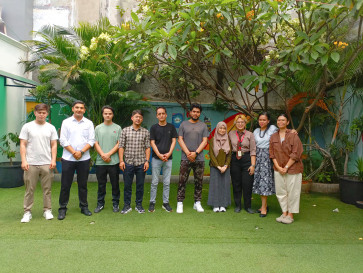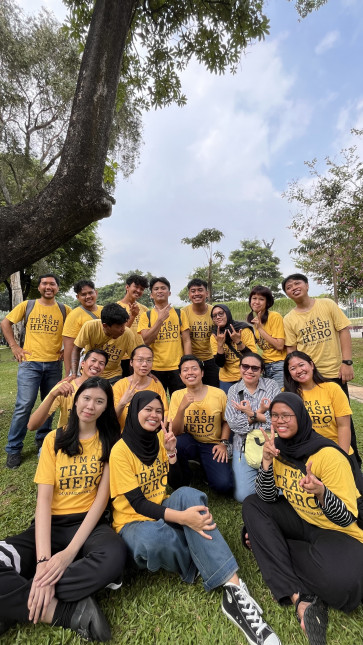“Kok gendutan?” (Why do you look like you’ve gained weight?) has been a constant refrain in my life, right alongside “Kapan kawin?” (When are you getting married?). These questions are practically national greetings in Indonesia.
Maybe it’s just my fate because I was born chubby. I’ve been in and out of my nutritionist’s care for the past five years, and I’ve tried it all: slimming pills, detox teas, keto, TR90 — you name it.
And I’m not the only one. According to the World Health Organization (WHO) and Health Ministry data, around 70 million Indonesians face weight-related issues—that’s nearly one in three people.
Is it any wonder then that finding the easiest and quickest way to lose weight almost feels like a national obsession?
Now everyone’s talking about the new kid on the weight-loss block: Ozempic.
Primarily used to treat type 2 diabetes, Ozempic mimics a natural hormone (GLP-1) that helps lower high blood sugar and slows down digestion. The result is a reduced appetite and, ultimately, weight loss.

Thank you!
For signing up to our newsletter.
Please check your email for your newsletter subscription.
Hyped by Hollywood celebrities, it has quickly become the latest weight-loss fad, and of course, Indonesia is catching on too.
But nutritionists are quick to say it’s still not “a magic cure”.
“We tell our patients they still have to exercise and eat well. Otherwise, the bounce back will be even worse,” says nutritionist Ira Andriani.
“There are also side effects. Short-term effects include nausea and headaches. Long-term use may even increase the risk of thyroid cancer, so it’s crucial to be under a physician’s care in order to monitor its use.”
That probably won’t stop thousands from trying to get their hands on it though, even if it means going outside the radar to get it.
Like an addiction
Ozempic may be the latest trend, but it's far from the only one. I could list countless methods and products for weight loss, but I believe most of us are already familiar with them, if not having already tried a few ourselves.
A few years ago, it was all about fiber drinks, multi-level marketing products and laxatives disguised as slimming pills, says Ira.
“Now we’re seeing a surge in fad diets, often popularized by influencers,” she adds. “We also see a surge in shaping treatments, liposuction, the Allurion gastric balloon, fat destroyer shots and many more.”
Do they work? Yes, but only for a while.
“They will not be sustainable unless you really change your lifestyle — eat well and exercise,” Ira explains.
They can even be dangerous.
“One of my clients lost 25 kg in just four months on a ketogenic diet. After the first month, she started to have bad breath but dismissed it, satisfied with her weight loss. By the fifth month, she had severe cramps that landed her in the ER, where she found out she had damaged her digestive tract,” Ira recounts.
So why do these trends persist when the dangers are well known?
“In my experience, most people know the dangers, but they are also ecstatic with the results they see in a short time and with little effort,” Ira adds. ”The high they get is like an addiction.”
Read also: 5 AI tools to boost your productivity
Unsustainable obsession
It’s difficult to pinpoint a single reason for this get-thin-quick obsession, says clinical psychologist Dini Rahma Bintari from Universitas Indonesia.
"On one hand, people are more aware of the health risks tied to obesity, so they’re adopting healthier lifestyles. But on the other hand, we’re bombarded with unrealistic beauty standards—think supermodels and K-pop idols—which influence our conversations.”
The “ideal” body has in fact shifted. We once admired curvier figures, but now we are obsessed with petite, Korean and Japanese-inspired physiques. And social media, especially among the youth, amplifies that obsession.
This shift is reflected in the age of kids going to nutritionists. Ira says that 60 percent of her clients are between 25 and 40 years old, while 20 percent are teenagers aged 11 to 18.
“Teenagers are interesting—95 percent of them are girls who say they’re not confident with how their bodies look due to puberty,” Ira says.
“But my youngest patient was just seven, brought in by parents concerned about their child’s appetite and weight. This usually happens with parents of girls who worry about their children’s appearance and potential hormonal imbalances, so they start seeking solutions early on.”
According to Ira, those who opt for an easy way out – pills, fad diets and colon cleanses – tend to be influenced by external concerns. “For instance, they have an occasion such as a wedding where they want to impress others, or they are seeking a “revenge body” to show off to their ex-lover. Funny as it may sound, it often happens.”
Others simply have neither the patience nor the diligence for safer methods which likely take longer and are more difficult.
“However, those who are motivated purely by health concerns, such as poor medical check-up results or wanting to have kids, tend to be more patient and wise. They understand that the journey is uncomfortable, but necessary,” she says.
Medical methods
The journey can also be expensive.
Nadia Vetta, 31, is a patient at one of Jakarta’s top nutritionists. She says she spent around IDR 6 million ($US389) per month on consultations, prescriptions and sometimes additional vitamin or booster shots. Even at that cost, she may still wait hours for her appointment.
“I was shocked at how effective it was. I admit the restrictions are tight, but they did work,” she says. “Would I recommend this? If you have the money and time, yes. Though I wonder what was the key – was it the diet, the medicine, the restrictions?”
Ozempic isn’t cheap, either. Accredited clinics usually sell Ozempic per pen, ranging from IDR 3 million to 6 million. Depending on the required dose, one pen can provide four to six shots, lasting one to two months.
The dosage depends on the patient’s weight and health condition, which is why doctors stress that it must be taken under medical supervision.
There is also a newer drug, Wegovy, that works similarly to Ozempic, but is marketed explicitly for weight loss and prescribed at a higher dosage. Wegovy has also been approved for weight loss in people with obesity or those who are overweight with at least one weight-related condition in Indonesia.
Part of the reason weight loss can be so complicated (and even costly) is that what works for one may not work for another.
“Health is personal—your goals and conditions differ from mine,” says Rifanditto, the founder and CEO of Sirka, an app where users can consult nutritionists, doctors and sports coaches to create personalized plans and prescription care with ongoing monitoring.
But even with these doctor-supervised methods, experts warn of the risk of being too obsessed with losing weight.
“Of course, eating disorders exist here in Indonesia. My own survey shows that cases and awareness are increasing, though it's not as widespread as in Western countries. As people learn more about these disorders, they either avoid them or, unfortunately, mimic them,” Dini explains.
“Any obsession is harmful, including the obsession with thinness. Beyond eating disorders, this can lead to other psychological issues. You harm your body, your hormones shift and this impacts your psychological well-being, creating a vicious cycle.”
Read also: Work, Play, Repeat: Jakarta’s shift toward balance in the office
Beyond the scale
Cath Halim, a content creator with almost 40,000 followers on Instagram, is one of the few influencers actively fighting this issue. Cath openly shares her past struggles with weight loss, which eventually led to an eating disorder. Now she advocates for wellness and self-love, regardless of what the number on the scale might be.
“It’s about normalizing body image issues. They’re pretty common, though most people don’t realize it. But I think more people are getting comfortable talking about it. Everybody’s journey with body image is different, but they’re all valid,” Cath says.
“Talking about it is already changing the narrative, but no single person or institution can handle it all. Everyone needs to play their part. Mainstream media should promote healthier living, not just weight loss, and we should celebrate diverse bodies. The government should also consider supportive policies.
“But more importantly, we have to educate ourselves. There’s a lot of information out there, and I’m happy to see that people are getting smarter. They now know that programs or products claiming to make you lose 10 kg in 10 days are lies.”
Cath also walks the talk by being selective with her partnerships.
“I don’t accept collaborations with brands that promote weight loss. I’m very clear about what I can and cannot endorse. Even for existing clients who launch diet products or detoxes, I explain that I can only take the wellness angle,” Cath says.
“I don’t want to say that weight loss is bad. There are cases where it’s necessary for health, but it’s not everything.”
I’m with you, Cath. I was born chubby and still am. I’ve tried it all — slimming pills, detox teas and endless diets. I’ve succeeded, bounced back, tried again and learned a lot along the way. I’ve come to realize that it’s time to stop measuring our worth by the scale and start focusing on what truly matters — our health, our happiness and our self-worth.
Read also: The great workplace debate: Remote, hybrid or office?
This article is part of The Weekender, a biweekly tabloid that appears in the Saturday edition of The Jakarta Post. Offering a variety of feature articles on lifestyle and culture, it aims to enriching your reading experience. Subscribe here to access The Jakarta Post’s Saturday edition and all Premium content.























